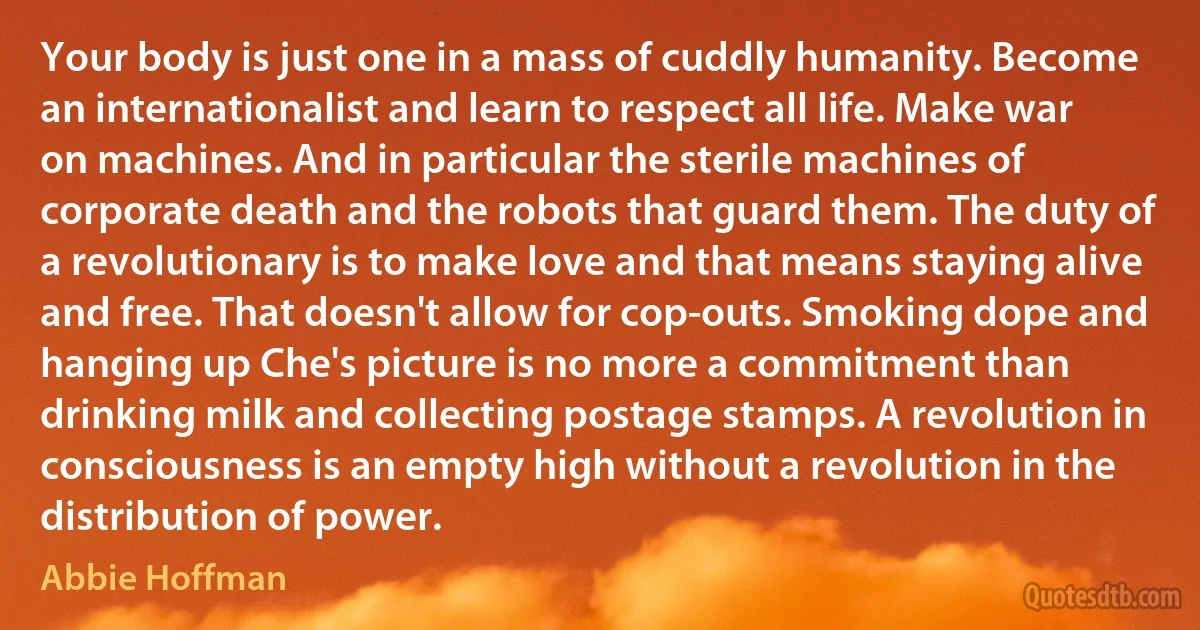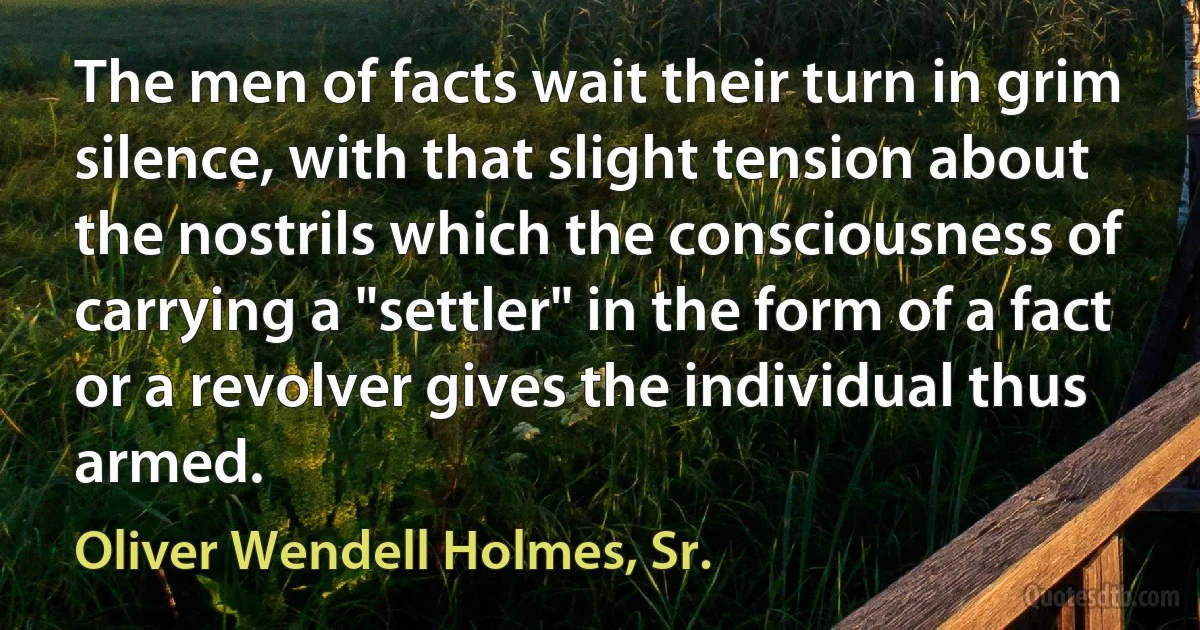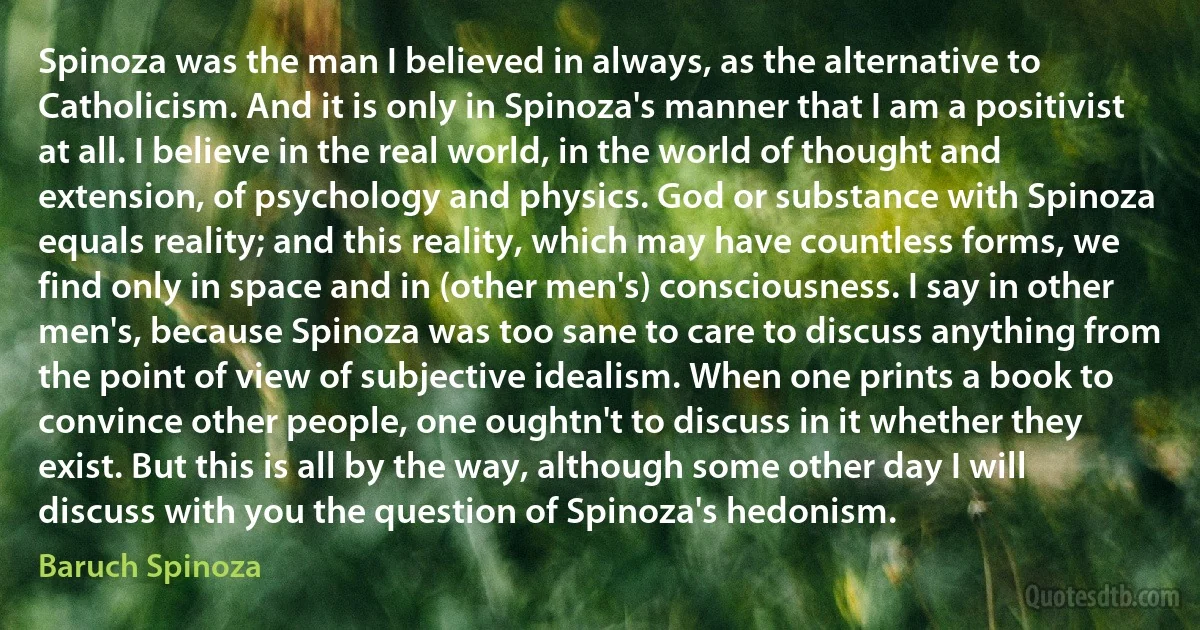Consciousness Quotes - page 77
Galileo's program offers us a dead world: Out go sight, sound, taste, touch, and smell, and along with them have since gone esthetic and ethical sensibility, values, quality, soul, consciousness, spirit. Experience as such is cast out of the realm of scientific discourse. Hardly anything has changed our world more during the past four hundred years than Galileo's audacious program. We had to destroy the world in theory before we could destroy it in practice.

Galileo Galilei
An acknowledgment of the full spectrum of consciousness would profoundly alter the course of every one of the modern disciplines it touches-and that, of course, is an essential aspect of integral studies... A full-spectrum approach to human consciousness and behavior means that men and women have available to them a spectrum of knowing-a spectrum that includes, at the very least, the eye of flesh, the eye of mind, and the eye of spirit.

Ken Wilber
Self, person, living being, and life span are four notions that prevent us from seeing reality.
Life is one. We do not need to slice it into pieces and call this or that piece a "self." What we call a self is made only of non-self elements. When we look at a flower, for example, we may think that it is different from "non-flower" things. But when we look more deeply, we see that everything in the cosmos is in that flower. Without all of the non-flower elements - sunshine, clouds, earth, minerals, heat, rivers, and consciousness - a flower cannot be. That is why the Buddha teaches that the self does not exist. We have to discard all distinctions between self and non-self.

Nhat Hanh
With This Bridge comenzado a salir de las sombras; hemos comenzado a reventar rutina costumbres opresivas y a aventar los tabues; hemos comenzado a acarrear con orgullo la tarea de deshelar corazones y cambiar conciencias (we have begun to come out of the shadows; we have begun to break with routines and oppressive customs and to discard taboos; we have commenced to carry with pride the task of thawing hearts and changing consciousness). Mujeres, a no dejar que el peligro del viaje y la inmensidad del territorio nos asuste-a mirar hacia adelante y a abrir paso en el monte (Women, let's not let the danger of the journey and the vastness of the territory scare us-let's look forward and open paths in these woods). Caminante, no hay puentes, se hacen puentes al andar (Voyager, there are no bridges, one builds them as one walks).

Gloria E. Anzaldúa
If by this superhuman concentration one succeeded in converting or resolving the two cosmoses with all their complexities into sheer ideas, he would then reach the causal world and stand on the borderline of fusion between mind and matter. There one perceives all created things - solids, liquids, gases, electricity, energy, all beings, gods, men, animals, plants, bacteria - as forms of consciousness, just as a man can close his eyes and realize that he exists, even though his body is invisible to his physical eyes and is present only as an idea. (Chapter 43 - "The Resurrection Of Sri Yukteswar")

Paramahansa Yogananda
"Father, there is little to tell." She (Sri Anandamoyi Ma) spread her graceful hands in a deprecatory gesture. "My consciousness has never associated itself with this temporary body. Before I came on this earth, Father, 'I was the same.' As a little girl, 'I was the same.' I grew into womanhood, but still 'I was the same.' When the family in which I had been born made arrangements to have this body married, 'I was the same... And, Father, in front of you now, 'I am the same.' Ever afterward, though the dance of creation change[s] around me in the hall of eternity, 'I shall be the same.' (Chapter 45)

Paramahansa Yogananda
Infinite consciousness is infinite. It can never lessen at any point in time or space. Infinite consciousness being infinite includes every aspect of consciousness. Unconsciousness is one of the aspects of infiniteconsciousness. Thus infinite consciousness includes unconsciousness. It sustains, covers, pierces through and provides an end to unconsciousness - which flows from, and is consumed by, infinite consciousness.

Meher Baba
The broader ontology typically associated with atheism is naturalism-there is only one world, the natural world, exhibiting patterns we call the "laws of nature,” and which is discoverable by the methods of science and empirical investigation. There is no separate realm of the supernatural, spiritual, or divine; nor is there any cosmic teleology or transcendent purpose inherent in the nature of the universe or in human life. "Life” and "consciousness” do not denote essences distinct from matter; they are ways of talking about phenomena that emerge from the interplay of extraordinarily complex systems. Purpose and meaning in life arise through fundamentally human acts of creation, rather than being derived from anything outside ourselves. Naturalism is a philosophy of unity and patterns, describing all of reality as a seamless web.

Sean M. Carroll
[W]e are talking about economic and political union. We are posing a question about political entity, about nationhood-the thing for which men, if necessary, fight and, if necessary, die, and to preserve which men think no sacrifice too great. In respect of our nationhood, then, I say that we are not a part of the continent of Europe. The whole development and nature of our national identity and consciousness has been not merely separate from that of the countries of the Continent of Europe but actually antithetical; and, with the centuries, so far from growing together, our institutions and outlook have rather grown apart from those of our neighbours on the continent. In our history, both recent and earlier, the principal events which have placed their stamp upon our consciousness of who we are, were the very moments in which we have been alone, confronting a Europe which was lost or hostile. That is the picture, that is the folk memory, by which our nation has been formed.

Enoch Powell
Of all types of human being, only the artist takes it upon himself to say that he 'cannot' work. But it is quite true; there ARE times when one cannot work. Money again, always money! Lack of money means discomfort, means squalid worries, means shortage of tobacco, means ever-present consciousness of failure - above all, it means loneliness. How can you be anything but lonely on two quid a week? And in loneliness no decent book was ever written.

George Orwell
The thing is that religion itself cannot but be dynamic which is why "return" is an incorrect term. A return to the forms of religion which perhaps existed a couple of centuries ago is absolutely impossible. On the contrary, in order to combat modern materialistic mores, as religion must, to fight nihilism and egotism, religion must also develop, must be flexible in its forms, and it must have a correlation with the cultural forms of the epoch. Religion always remains higher than everyday life. In order to make the elevation towards religion easier for people, religion must be able to alter its forms in relation to the consciousness of modern man.

Aleksandr Solzhenitsyn
At the level of ordinary consciousness the individual man is the centre of everything, surrounded on all sides by what he isn't. At the level of practical sense, or civilization, there's a human circumference, a little cultivated world with a human shape, fenced off from the jungle and inside the sea and the sky. But in the imagination anything goes that can be imagined, and the limit of the imagination is a totally human world.

Northrop Frye
If you awaken from this illusion, and you understand that black implies white, self implies other, life implies death-or shall I say, death implies life-you can conceive yourself. Not conceive, but feel yourself, not as a stranger in the world, not as someone here on sufferance, on probation, not as something that has arrived here by fluke, but you can begin to feel your own existence as absolutely fundamental. What you are basically, deep, deep down, far, far in, is simply the fabric and structure of existence itself. So, say in Hindu mythology, they say that the world is the drama of God. God is not something in Hindu mythology with a white beard that sits on a throne, that has royal perogatives. God in Indian mythology is the self, Satcitananda. Which means sat, that which is, chit, that which is consciousness; that which is ananda is bliss. In other words, what exists, reality itself is gorgeous, it is the fullness of total joy.

Alan Watts
The reality is that many businesses, large and small, have long used undocumented workers to pad their bottom lines. Just consider the agricultural workforce. In California alone-where the $45 billion-a-year agricultural sector supplies more than half the produce consumed in the United States-between 40 and 50 percent of the workforce is made up of undocumented workers. No wonder California has been the site of some of the most important immigrant labor struggles, brought to the consciousness of many Americans in the 1960s and 1970s by the great United Farm Workers leader, Cesar Chavez. That struggle continues today.

Cesar Chavez
Neutrality toward Spinoza set in once one was able to admit that the "modern worldview," whose victory was decisively aided by Spinoza's metaphysics, does not, or does not entirely, coincide with this metaphysics. But even at this stage it was still generally maintained, and even emphasized, that among the three great Western philosophers of the seventeenth century - Descartes, Hobbes, and Spinoza - Spinoza was the most important one because, he was the most progressive one. He alone had drawn certain consequences from the foundations of modern philosophy, which became fully clarified only in the nineteenth century and which henceforth determined the general consciousness.

Baruch Spinoza
What, in our day, does democracy mean? To my mind, it should mean one person, one vote. It should mean an equal opportunity for all who wish to seek public office. It should mean that the wealthy don't have undue influence over the election process. It should mean that voting and participating in the political process is as easy and convenient as possible, and that barriers are not erected to prevent groups of citizens from exercising their right to participate. It should mean that poor people, old people, young people, and people of color are not discriminated against when they want to vote. It should mean that the United States has one of the highest voting turnout rates in the world, not one of the lowest. It should mean that political consciousness is high and that people are aware and well informed about the major challenges our nation is facing.

Bernie Sanders
'Every Hindu knew not only that he belonged to a particular caste but also that others belonged to other castes of whose respective places in a broader scheme of things he had some idea, whether vague or stereotyped. Hardly anything corresponding to this exited in the case of those we know today as tribes. The consciousness of the distinct and separate identity of all the tribes of India taken as a whole is a modem consciousness, brought into being by the colonial state and confirmed by its successor after independence.

Andre Beteille
It is the fallacy of all intellectuals to believe that intellect can grasp life. It cannot, because it works in terms of symbols and language. There is another factor involved: consciousness. If the flame of consciousness is low, a symbol has no power to evoke reality, and intellect is helpless.

Colin Wilson
Men don't know anything! Men don't know when their lives became so entirely awful, when everyone else turned into such a tosser! A man does not know how he came by the half a pie he is holding in his hand. And scientists-those frauds!-seize on this, and try to use it as proof of the mysteries of human consciousness and the unknowable nature of the brain, which is rubbish! The brain is the simplest organ in the body. It only has three bits. There's the front bit, which is the bit you scratch when you come in at half one in the morning, and the person you live with says, "Where the fuck were you?”. The middle bit, which tries to come up with the excuse. And the back bit, which plays the last song that was on in the pub.

Dylan Moran



